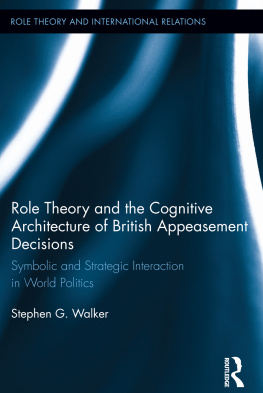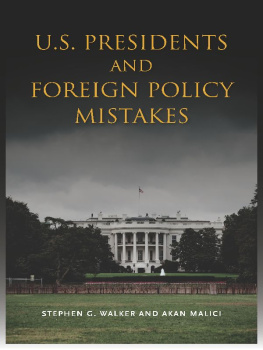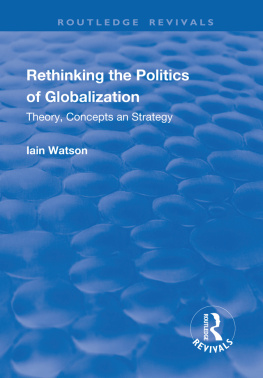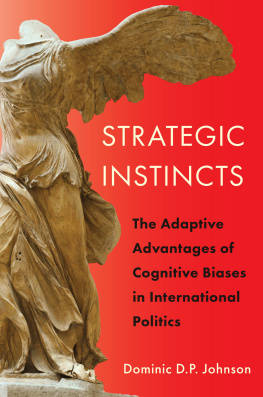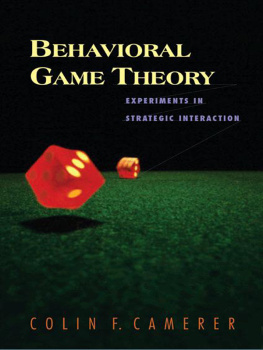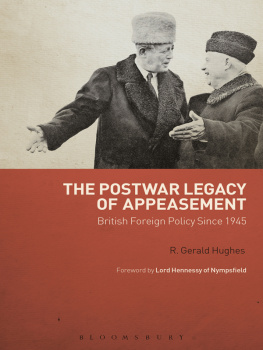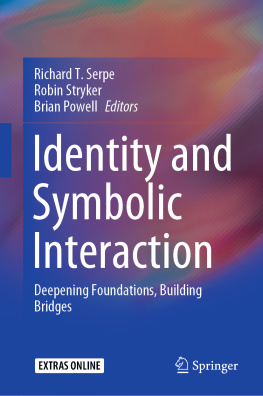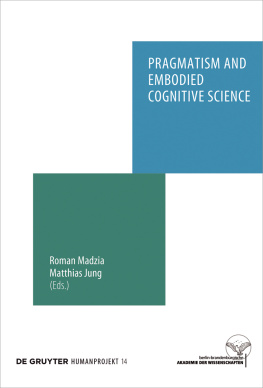This book unequivocally demonstrates the theoretical and empirical utility of role theory for IR while at the same time providing new insights into British foreign policy in the 1930s. Walkers mix of historical narrative and formal analysis is unexcelled. All those concerned with agents and structures will find this book enlightening and refreshinga must read.
John Vasquez, University of Illinois at Urbana-Champaign
Observers of world politics have long agreed that Britains decisions to appease Imperial Japan, Mussolinis Italy and Hitlers Germany contributed to the outbreak of World War II, but they have proposed varying explanations for those decisions. Drawing upon both archival evidence and mathematical analysis, Stephen Walkers path-breaking new book develops a compelling case for role theory as a general analytic solution to the appeasement puzzle. His conclusion indicates that leaders beliefs and preferences provide a powerful explanation for how and why foreign policy decisions are made.
Ole R. Holsti, Duke University
Role Theory and the Cognitive Architecture of British Appeasement Decisions
Appeasement is a controversial strategy of conflict management and resolution in world politics. Its reputation is sullied by foreign policy failures ending in war or defeat in which the appeasing state suffers diplomatic and military losses by making costly concessions to other states. Britains appeasement policies toward Germany, Italy, and Japan in the 1930s are perhaps the most notorious examples of the patterns of failure associated with this strategy. Is appeasements reputation deserved or is this strategy simply misunderstood and perhaps improperly applied?
Role theory offers a general theoretical solution to the appeasement puzzle that addresses these questions, and the answers should be interesting to political scientists, historians, students, and practitioners of cooperation and conflict strategies in world politics. As a social-psychological theory of human behavior, role theory has the capacity to unite the insights of various existing theories of agency and structure in the domain of world politics. Demonstrating this claim is the methodological aim in this book and its main contribution to breaking new ground in international relations theory.
Stephen G. Walker is Emeritus Professor of Political Science in the School of Politics & Global Studies at Arizona State University. He served as a co-editor of International Studies Quarterly (1985) and as a vice president of the International Society of Political Psychology (19971999) and the International Studies Association (20032004). He received the Distinguished Scholar Award from the Foreign Policy Section of the International Studies Association in 2003.
Role Theory and International Relations
Edited by Cameron G. Thies , University of Iowa , and Juliet Kaarbo , University of Edinburgh
The Role Theory and International Relations Series aspires to attract and publish the latest and best research integrating knowledge in the field of international relations with role theory. This aspiration cuts across a wide swath of subfields, including foreign policy analysis, peace and security studies, international political economy, diplomatic studies, and international organization. While each of these subfields of study is presently organized as an island of theory, this series intends to integrate their signature phenomena within a system of knowledge, a theory complex or an alliance among different subfields. This series showcases the ability of role theory to generate useful theoretical insights on its own or in combination with existing theories across these traditional subfields. Role theorys conceptual repertoire, plus its ability to span multiple levels of analyses and the major meta-theoretical divides in the discipline position it to be an important integrative force in the study of international relations.
1 Rethinking Foreign Policy Analysis
States, Leaders, and the Microfoundations of Behavioral International Relations
Edited by Stephen G. Walker, Akan Malici, and Mark Schafer
2 The United States, Israel, and the Search for International Order Socializing States
Cameron G. Thies
3 Role Theory and the Cognitive Architecture of British Appeasement Decisions
Symbolic and Strategic Interaction in World Politics
Stephen G. Walker
Role Theory and the Cognitive Architecture of British Appeasement Decisions
Symbolic and Strategic Interaction in World Politics
Stephen G. Walker
First published 2013
by Routledge
711 Third Avenue, New York, NY 10017
Simultaneously published in the UK
by Routledge
2 Park Square, Milton Park, Abingdon, Oxon OX14 4RN
Routledge is an imprint of the Taylor & Francis Group, an informa business
2013 Taylor & Francis
The right of Stephen G. Walker to be identified as author of this work has been asserted by him/her in accordance with sections 77 and 78 of the Copyright, Designs and Patents Act 1988.
All rights reserved. No part of this book may be reprinted or reproduced or utilized in any form or by any electronic, mechanical, or other means, now known or hereafter invented, including photocopying and recording, or in any information storage or retrieval system, without permission in writing from the publishers.
Trademark Notice: Product or corporate names may be trademarks or registered trademarks, and are used only for identification and explanation with out intent to infringe.
Library of Congress Cataloging-in-Publication Data
Walker, Stephen G., 1942
Role theory and the cognitive architecture of British appeasement decisions: symbolic and strategic interaction in world politics / Stephen G. Walker.
pages cm. (Role theory and international relations)
1. Great BritainForeign relations 19361945. 2. Great Britain Politics and government20th century. 3. International relations Research. I. Title.
DA586.W27 2013
327.1'1dc23
2013013417
ISBN 978-0-415-83235-9 (hbk)
ISBN 978-0-203-48809-6 (ebk)
Typeset in Sabon
by Apex Covantage, LLC
Contents
In this book I revisit a substantive problem that was the focus of my doctoral dissertation over forty years ago. Along with several other scholars who were puzzled by Britains strategy of appeasement in dealing with Nazi Germany, I reviewed available historical documents from the British archives and the memoirs of British leaders as I attempted to understand the constraints that influenced Britains appeasement decisions. Over the years I have returned intermittently to this problem as new documents became available and as my research interests shifted from systems theories of world politics to agent-oriented theories of foreign policy decisions. In the last decade I have attempted to synthesize these two theoretical views conceptually with role theory as a unifying theory of world politics. The substantive focus in this book on Britains strategic interactions in the 1930s with Germany, Italy, and Japan represent my first attempt to apply this theory to an extensive body of empirical materials with the aid of a variety of narrative, formal modeling, and statistical techniques.
Several colleagues and co-authors have participated and collaborated in my previous attempts to understand Britains appeasement decisions since the inception of the research program in role theory and international relations by Kalevi J. Holsti during the cold war and its later extension by James N. Rosenau to the present era of globalization and complex interdependence in world politics. They include George Watson, Mark Schafer, Greg Marfleet, and Akan Malici plus several graduate students at Arizona State University who helped collect and code the quantitative data reported in some of the chapters in this book. Their contributions are gratefully acknowledged here and recognized as well by their roles as co-authors with me in earlier publications based on these data sets.


